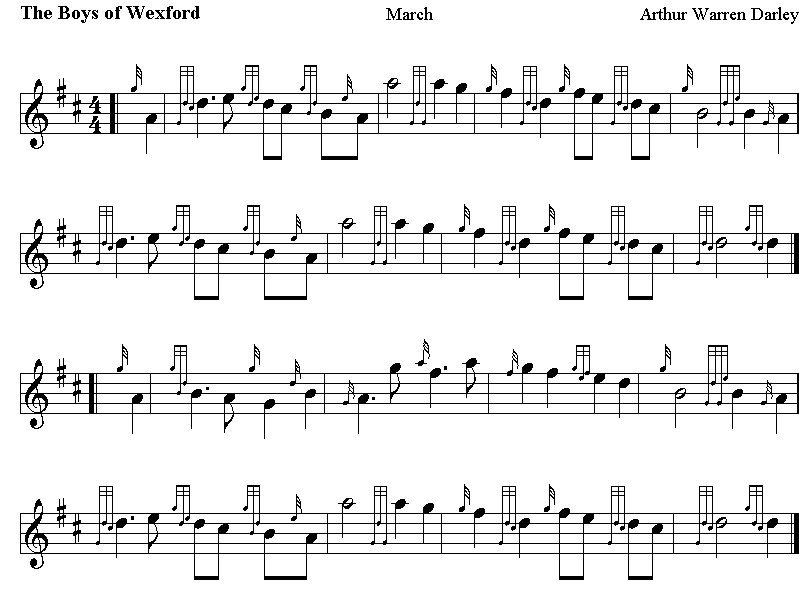|
Wexford (from the
Old Norse: Waes Fjord meaning "inlet of
the mud flats", also Irish: Loch Garman)
is the county town of
County Wexford in the Republic of Ireland. It is situated near the
south-eastern tip of Ireland. Wexford lies on the south
side of
Wexford
Harbour, the estuary of the
River Slaney. The town was settled by the
Vikings in about 800 AD. They named it Waes
Fjord, inlet of the mud flats, and the name
has changed only slightly into its present form.
County
Wexford
was the centre of the 1798 rebellion against
English rule. Wexford town was held by the
rebels throughout the fighting and was the scene
of a notorious massacre of local loyalists by
the United Irishmen, who executed them on the
bridge in the centre of Wexford town.
The Boys of Wexford
is a famous Irish ballad commemorating the Irish
Rebellion of 1798. The ballad was lyrics were
composed by Patrick Joseph McCall and music by
Arthur Warren Darley, who also composed other
Wexford ballads "Boolavogue", "Kelly
the Boy from Killanne". Patrick Joseph McCall
(6 March1861 – 1919) was an Irish
poet, known mostly
as the author of lyrics for popular ballads. He
was born in Dublin, Ireland, the son of John
McCall, where he attended St. Joseph’s
Monastery, Harold’s Cross, a Catholic University
school. He spent his summer holidays in
Rathangan, County Wexford where he spent time
with local musicians and ballad singers. He also
collected many old Irish airs, but is probably
best remembered for his patriotic ballads. He
attended Catholic University School in Dublin.
Arthur Warren Darley
(1873-1929)
was an Irish Fiddle player, composer, music
teacher and examiner as well as a traditional
music archivist. Darley was born in Dun
laoghaire and first lived in Silchester Road. He
was a grandnephew of poet George Darley. His
father Henry Warren Darley had converted to
Catholicism. In 1923 he purchased a house in
Northumberland Road, Dublin. His family was
musical both in traditional and classical. His
grandfather played the uilleann pipes and
fiddle, his father played fiddle and viola and
Arthur played fiddle and piano. Arthur was
playing the fiddle well at 8 years of age. He
was a fellow in The College of Violinists,
London, Professor of Leinster School of Music &
Drama, Director of the municipal School of
Music, and was deeply interested in Irish Music.
He met Patrick Joseph McCall who spent much of
his time in Wexford. Together they collected old
tunes and Ossian Publications published them.

Lyrics
|
In comes the captain's
daughter,
The captain of the Yeos,
Saying: Brave United
Irishmen,
We'll ne'er again be
foes.
A thousand pounds I'll
bring
If you will fly from
home with me,
And dress myself in
man's attire
And fight for liberty.
Chorus:
We are the boys of
Wexford,
Who fought with heart
and hand
To burst in twain the
galling chain
And free our native
land.
I want no gold, my
maiden fair,
To fly from home with
thee;
You shining eyes will be
my prize -
More dear than gold to
me.
I want no gold to nerve
my arm
To do a true man's part
-
To free my land I'd
gladly give
The red drops of my
heart."
Chorus |
And when we left our
cabins, boys,
We left with right good
will
To see our friends and
neighbours
That were at Vinegar
Hill!
A young man from our
Irish ranks
A cannon he let go;
He slapt it into Lord
Mountjoy -
A tyrant he laid low!
Chorus
We bravely fought and
conquered
At Ross and Wexford
town;
Three Bullet Gate for
years to come
Will speak of our
renown;
Through Walpole's horse
and
Walpole's foot
On Tubberneering's day,
Depending on the long,
bright pike,
We cut our gory way.
Chorus
And Oulart's name shall
be their shame,
Whose steel we ne'er did
fear.
For every man could do
his part
Like Forth and
Shelmalier!
And if for want of
leaders,
We lost at Vinegar Hill,
We're ready for another
fight,
And love our country
still!
Chorus |
|
|
|



